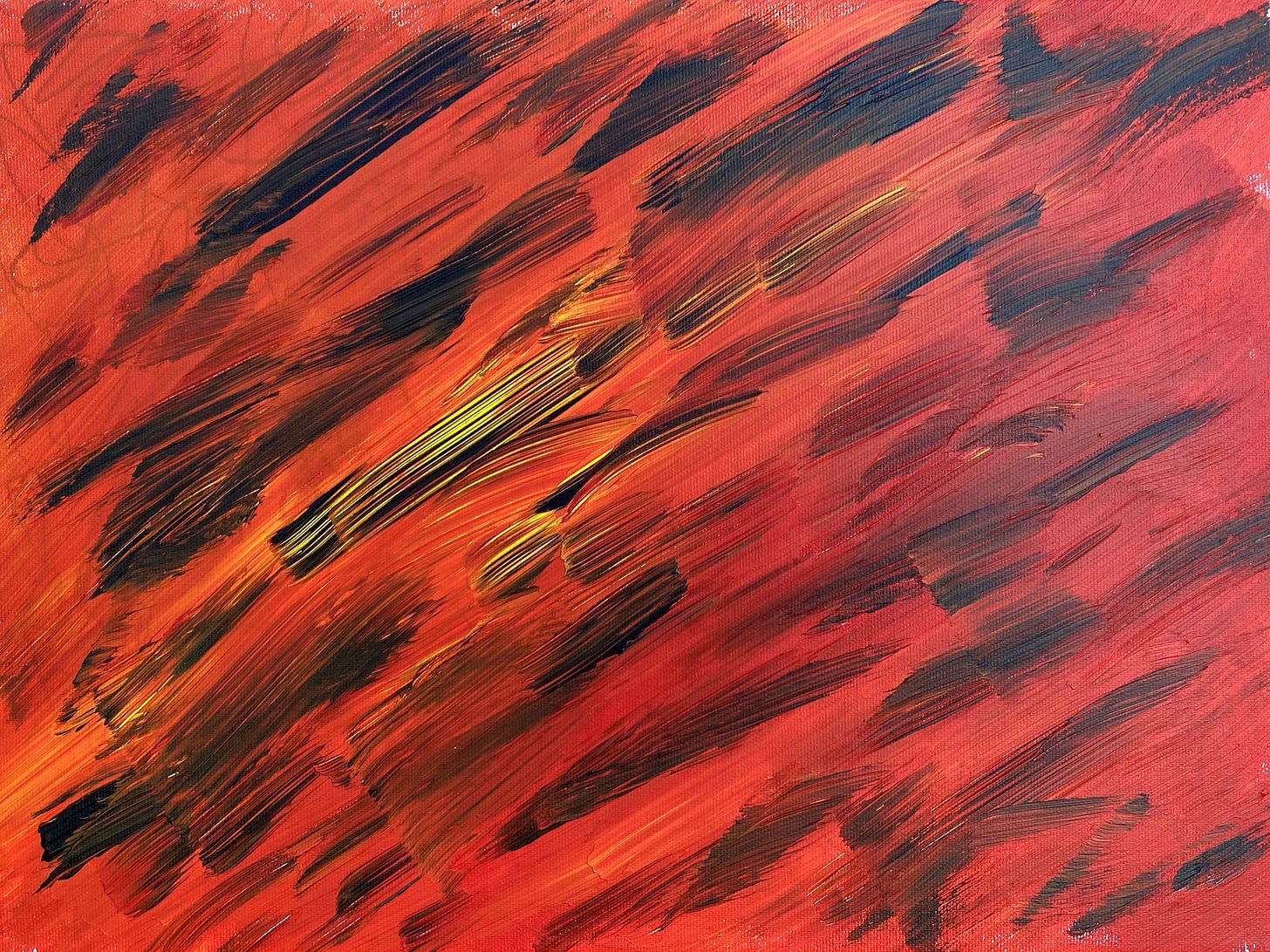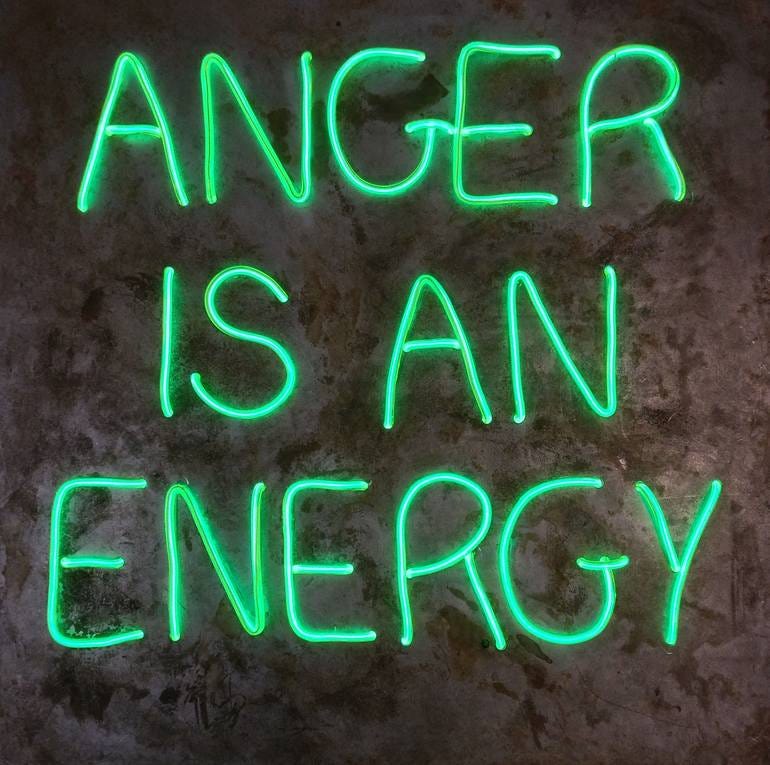I once asked a chaplain intern what emotion they were most uncomfortable feeling. Without missing a beat, they said: “Anger. I don't trust it. I don't want to be consumed by it.”
They’re not alone. Most of us don’t love feeling angry.1
Mad has become synonymous with bad. And because of that, we probably weren’t taught how to feel anger in healthy ways.
But what if anger wasn’t something to suppress or fear? What if anger was a sacred teacher, pointing us toward the places in our life or soul that need attention?
Anger isn’t negative, it’s neutral. Feelings are just information. They can help us read a situation and/or motivate us to act.
“Anger is loaded with information and energy." - Audre Lorde, The Uses of Anger
Anger is telling us something worth paying attention to. If we harness the energy wisely, it can move us toward action or justice. Anger is not a sin; it’s a signal.
The problematic expression of anger is what can be labeled “bad.” We don’t want to raise our voices, say things we regret or resort to violence. Losing control of our actions is not the only option available to us.
I tell my kids, “You’re allowed to be angry, but you’re not allowed to slam the door.” They can be upset at losing screentime (for not getting chores done), but it’s what they do with that anger that might be inappropriate.
When I was in social work school, learning about neurodivergence, one of the symptoms was low frustration tolerance. It is defined as
“The inability to tolerate unpleasant feelings or stressful situations. It stems from the feeling that reality should be as wished, and that any frustration should be resolved quickly and easily. People with low frustration tolerance experience emotional disturbance when frustrations are not quickly resolved.”2
Doesn’t this sound like something many of us struggle with? Of course we want to return to a more peaceful state as quickly as possible.
But if we ignore our frustrated state and hope it goes away, we are in denial. When we don’t express our anger, it can manifest in unintended ways. One of my students referred to anger as a balloon. It can only fill up so much and then it will pop. Usually at an inappropriate time. My family can tell you my balloon often pops when I’m hangry and/or trying to get everyone out the door on time.
Or perhaps you tend to be more “passive-aggressive". The APA points out the signs of this as "procrastination, dawdling, stubbornness, intentional inefficiency, ‘forgetting’ appointments, or misplacing important materials.” Or my favorite, sarcasm!
Whether we tend to explode or repress, or somewhere in between those extremes, we can all figure out ways to have a healthier relationship with anger.
Two Magic Questions
When one of my chaplain students or spiritual directees is feeling angry about something there are two questions I ask them to use as a barometer for further understanding. The first question is:
· Who or what am I really angry at?
This one feels obvious, as sometimes the situation they are referencing is infuriating enough. But sometimes it is about something deeper.
If I’m mad about sitting in traffic, it’s not really the other drivers on the road who are exacerbating my ire, even though they might be the most obvious target (and we New Jersey drivers are a rough bunch!). If I scratch below the surface, I’m mad that I’m running late for a meeting that I only found out about the day before from my boss. And I’m also unprepared for it, partly because I was up all night with a sick kid when my husband was away. I might be mad at my boss, my kid, or my husband – or the larger societal construct that makes it hard to be a working parent. Or maybe I’m mad at myself for not being able to juggle it all. One situation can stem from different sources of our anger.
Anger can also be a cover emotion. Sometimes our initial response is anger, but deep down we are really feeling scared or sad.
Take the example above. If I determine that I’m angry at myself for running late, not being prepared, or not being able to handle it all, that could be a fear of being inadequate. And if I view myself as less than capable, that can easily lead to sadness or misery.
Or keeping with the road rage theme - maybe someone cuts me off and I have some choice curse words for them. I might present as angry, but really, I’m scared that I almost just got into an accident.
Inquiring deeper into our anger with this first question helps us identify if it is solely anger or if there are other emotions in the mix.
My second question is two-fold:
· Who does this person remind me of? Do they represent something about myself I don't like?
Sometimes in CPE3 a student is annoyed by another student. This is to be expected when people are working in close quarters. We’ve all had co-workers who have gotten under our skin. But sometimes the level of frustration is an outsized reaction to someone else. And since we can’t change other people (as much as I would like to), we can only explore and then change our response to them.
Do you have someone in your life who has an uncanny ability to push your buttons? Rather than focusing on how terrible they are (even if they are the worst!), think about who else in your life they might represent. Sometimes issues in our more superficial relationships can be stand-ins for other, more meaningful relationships.
Or consider how you might be like this person. The very thing that drives us batty in someone else might point to a trait we don’t like in ourselves. It’s a hard mirror to look at, but one that can help us uncover the basis of our anger.
Yellin’ at the Lord
In the movie The Apostle, written by Robert Duvall, he plays a preacher named Sonny. The movie is a complex portrayal of Sonny’s life and character. In one scene, Sonny is upset, yelling and pacing back and forth. His elderly mother (played by June Carter Cash) fields a call from the police at 2 am due to a noise complaint. In a southern twang, she describes her son’s actions, saying:
“That is my son that is. I tell ya ever since he was an itty-bitty boy, sometimes he talks to the Lord and sometimes he yells at the Lord, tonight he just happens to be yellin at him.”
I love this scene because anger at God is one of the topics I hear about most in my work.
People share their anger at God with me tentatively at first. They have been raised to believe they aren't supposed to have anger toward God. They worry that it’s blasphemy. I wish my patients knew just how many people find themselves in that particular spiritual thicket.
As a chaplain, I am a safe harbor for anger at God because of my anonymity. "I can tell you this, but I would never tell my priest" is a refrain I hear again and again. Anger at God is a completely normal and expected response. And as we exist in a culture steeped in spiritual toxic positivity, anger at God is a natural byproduct of those harmful platitudes. If we are told that suffering is a test or for our own good or a divine plan we can't see, then of course we are going to be angry at that God who is doing that to us. 4
If you find yourself angry at God, I believe the expression of that emotion is welcome.
Just as we get angry with others in our lives, little good comes from ignoring it or pretending we aren’t angry. Barbara Brown Taylor wrote, “Faith is not about having all the answers. Sometimes, faith is simply refusing to walk away, even when you're furious with God.”
A patient said to me, “I’ve heard an expression that God never puts more on your plate than you can deal with. I just wish God would realize that I have a small plate.” This was a patient who lost her husband AND her daughter in one day. This patient was a Deacon whose church told her to focus on all the good things God had given her. This was a patient who was furious at God, but afraid to admit it to anyone. She desperately wanted to yell at the Lord but didn’t know she was allowed to.
Henri Nouwen wrote, “We do not have to sugarcoat our feelings before God. If we look at Scripture, we see people cry out in frustration, in grief, even in rage. And God remains.”
When Anger Covers Grief
I often encourage the medical team to consult spiritual care when a patient is described as “difficult.” Anger and irritability can be signs of spiritual distress. One hospital even had a secret code: “DP” Difficult Patient. I prefer “CP” Complex Patient. And aren’t we all complex?
Ben was one of these CPs. An elderly man who kept pressing his call bell to loudly complain about the food, the care, even the TV channels. His nurse said to me, “You’d be doing me a favor by going in there. I need a break from his yelling.”
When I introduced myself, Ben was predictably gruff. He launched into a rant about the hypocrisies of organized religion, which I’ve come to expect when I identify as a chaplain. He ended his diatribe with, “I went to church as a kid, but I’ve got no need for a God who lets parents abandon their children.”
That sounded specific. I asked if he’d be willing to say more.
He shared that his mother died when he was a freshman in high school. His father quickly remarried and the new wife didn’t want children. Ben and his younger brother were sent to live with a distant relative, in a situation that turned abusive. “So I got outta dodge,” he said. He ran away, lived on the street, and joined the Navy when he was old enough. With tears in his eyes, he added, “I still feel guilty for leaving my little brother behind.”
Then he gestured to his abdomen, where his tumors were. “I’ve been wondering if this is punishment,” he said quietly. “For not going back for him. I was just a dumb kid. He turned out okay, but… I still feel bad.”
Ben’s anger masked deep sadness. Yes, he was mad. At God, at his father, at a system that failed him. But beneath the surface was guilt, grief and decades of unprocessed pain. No wonder he was yelling.
"Anger is the deepest form of compassion, for another, for the world, for the self, for a life, for the body, for a family, and for all our ideals..." - David Whyte, Consolations
What to do with your Anger?
Here are some practical steps to addressing your anger, whether it’s directed at God or something or someone else in your life:
Name it & Bless it
“You cannot transform what you do not acknowledge. Anger is a signal and one worth listening to." - Harriet Lerner, The Dance of Anger
We must start by identifying that we are indeed angry about something. Many of us say we are “fine” when asked about our feelings. I find this to be especially true for Christians, for women and people of color. Anger is deemed as an “unacceptable emotion” and might have been used against us. As a result, we may not even realize that we are angry.
Get to know what you look like when you’re angry. Do you get quiet? Do you start to cry? Does your face get flushed? Where in your body do you feel it?
When the Dalai Lama was asked how he deals with his anger, he said that he starts by identifying it and saying, “Hello, little anger.” What might it look like to say hello to our anger? And then ask the magic questions to get to the root of it.
Step two is harder. I invite you to see your anger as a holy gift. We only get angry about the people and things we care deeply about. It is a sign that you are involved in and committed to someone/something.
Create a Rage Ritual
During the early days of the pandemic quarantine, moms reached their breaking point and some began meeting up in store parking lots to “scream into the void” together. I thought this was brilliant and tapped into a need that some of us didn’t even know we had. I also loved it because it was a communal act. People didn’t have to be alone in their anger, they could express it together (even while socially distanced).
Last year, I took my chaplain department to a “Wreck Room.” There are a few of these types of places around where you select a bat, a golf club, a crowbar or other instrument of destruction. Then you enter a room full of old dishes, glasses and bottles otherwise destined for the dumpster. (I liked the satisfying ease at which the empty liquor bottles broke!) I’ve also heard of other “Rage Rooms” that have mats on the wall, foam pits and soft balls to throw around if that is more your speed.
If God is the target of your pain, you may want to consider tapping into the 20 or so Psalms in the Bible that are “cursing Psalms” or “Psalms of Lament.” I didn’t realize these existed until I was in seminary, but I think they are a valuable tool for us to use.
Old Testament scholar Ellen Davis, in her book Getting Involved with God, writes that as a young seminarian, she had a bitter experience of betrayal by a close friend. She writes “My pastoral theology professor saw my need, and he gave me a list of psalm numbers with the advice ‘Go into the chapel when no one else is around and shout these at the top of your lungs’ It was the most helpful advice anyone gave me at the time – especially the part about the shouting.” Davis points out that the Psalms helped her vent her anger, but more importantly, they helped her move beyond her blind rage.
What would it look like for you to scream into the void? Throw some balls around? Shout a Psalm? Or come up with another way to express your inward pain outwardly?
Use it as Fuel
"Anger is like gasoline. If you spray it around and somebody lights a match, you've got an inferno. But if we can put our anger inside an engine, it can drive us forward." - Scilla Elworthy
You’ve heard the adage, “If you’re not angry, you’re not paying attention.” There are so many things to be mad about right now that are far beyond our control. Anger can lead to helplessness or apathy if we aren’t able to channel it into something productive. But as Audre Lorde stated, anger has information and energy. How might we transmute that into a force toward justice?
Anger can be a sign that something needs to change.
Anger is an invitation to act. To do something.
What is your anger telling you? Is it that you need to have a difficult conversation?5 To advocate for yourself or others? To set a boundary? How can your anger help you be a catalyst for growth?
Don’t Get Stuck
I have gotten stuck in my anger. I was so overwhelmed by it that I didn’t know what to do. I certainly didn’t see it as a gift. It’s possible to get bogged down by our anger, especially those of us who are good at ruminating or holding grudges. The previous steps involving ritual and fuel might drive you toward transformation. But if not, here’s a technique that might help you get un-stuck.
The Sedona Method involves naming what you’re angry about. And then you give your anger a timeline. You ask yourself - “How long am I going to choose to be angry about this?” And then be very specific about how long you want to hold onto that anger. “I am going to be angry about this until Tuesday at 2pm.” When that time comes, you re-evaluate it and ask yourself the question again, giving yourself a new timeline if needed and then repeat.
Sometimes, by Tuesday at 2pm, I had completely forgotten about using the method and what I was initially angry about. Sometimes, I was still enraged and extended my self-imposed deadline for a few more days or weeks. Other times, when my timeline came, I realized, “Actually, I am ready to not be angry about this anymore.”
This method helped give me permission to hold on to my anger and also release it when it was no longer serving me. It works better with smaller issues, but I’ve used it for bigger ones too.
A poem that reminds me to welcome all my emotions, anger included, is Rumi’s “The Guest House.” I encourage you to (re)read it and wonder about what part of your human experience is knocking on your door today.
The Guest House by Rumi
This being human is a guest house.
Every morning a new arrival.
A joy, a depression, a meanness,
some momentary awareness comes
as an unexpected visitor.
Welcome and entertain them all!
Even if they’re a crowd of sorrows,
who violently sweep your house
empty of its furniture,
still, treat each guest honorably.
He may be clearing you out
for some new delight.
The dark thought, the shame, the malice,
meet them at the door laughing,
and invite them in.
Be grateful for whoever comes,
because each has been sent
as a guide from beyond.
If you are in a place where you are angry with God and need someone to journey alongside you, I have spots open for Spiritual Direction. You can get in touch by replying to this email, contacting me through my website or clicking the link below.
What Rage Rituals have worked for you?
When have you used your anger as fuel?
What does it look like when you get angry? Tears? Quiet? How would someone else know?
Related Posts:
Two future posts coming soon(ish) - Feedback & Conflict!














I think I may suffer from “low frustration tolerance” and I know exactly what frustrates me; the French bureaucracy! I wonder if they have any “wreck rooms” here?!? Hmmm . . . maybe the French bureaucracy provides them!?!
I really like this Sedona Method. How long am I going to choose to be angry over this? Often I find that the frustration dissipates when I simply do something else! Sometimes it can be a matter of just turning my attention to something else. Often I come back, not so frustrated and I figure it out pretty quickly. Now can I just say that it this takes a lot of spiritual discipline to turn to something else? But it’s a process . . .
This is probably the best article on anger that I have read Christine. I like the reference to anger as a fuel.
In 2002, when I was arrested in Zimbabwe for the "crime" of refusing to leave my legally owned farm during the government's illegal theft of 5000 white owned farms, anger kept me sane.
I found that anger at the injustice, 5 hours of verbally abusive interrogation by, at times, 5 security police and 3 days and nights in an overcrowded, filthy police cell helped me treat the experience as a game and kept fear at bay.
Moving to Canada as a virtual refugee with no assets and no cash, I soon realised that I had to let that anger go and accept a life vastly different from the one I had before.